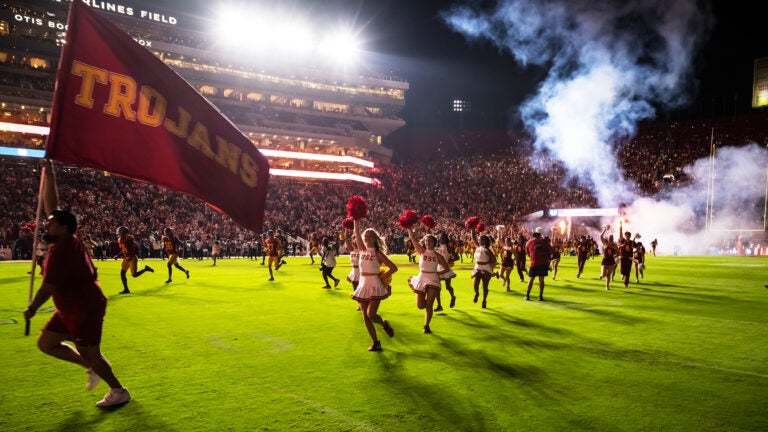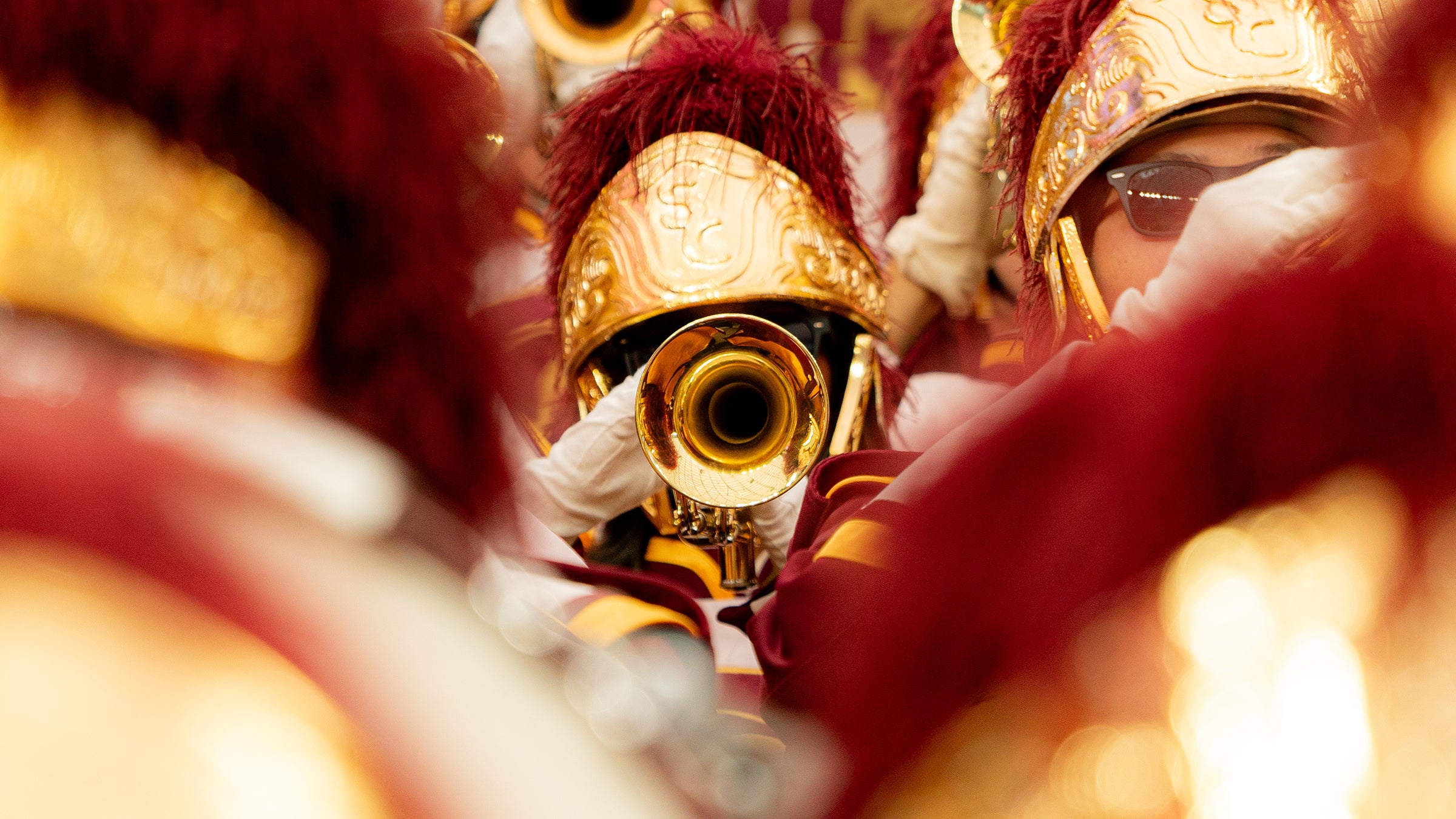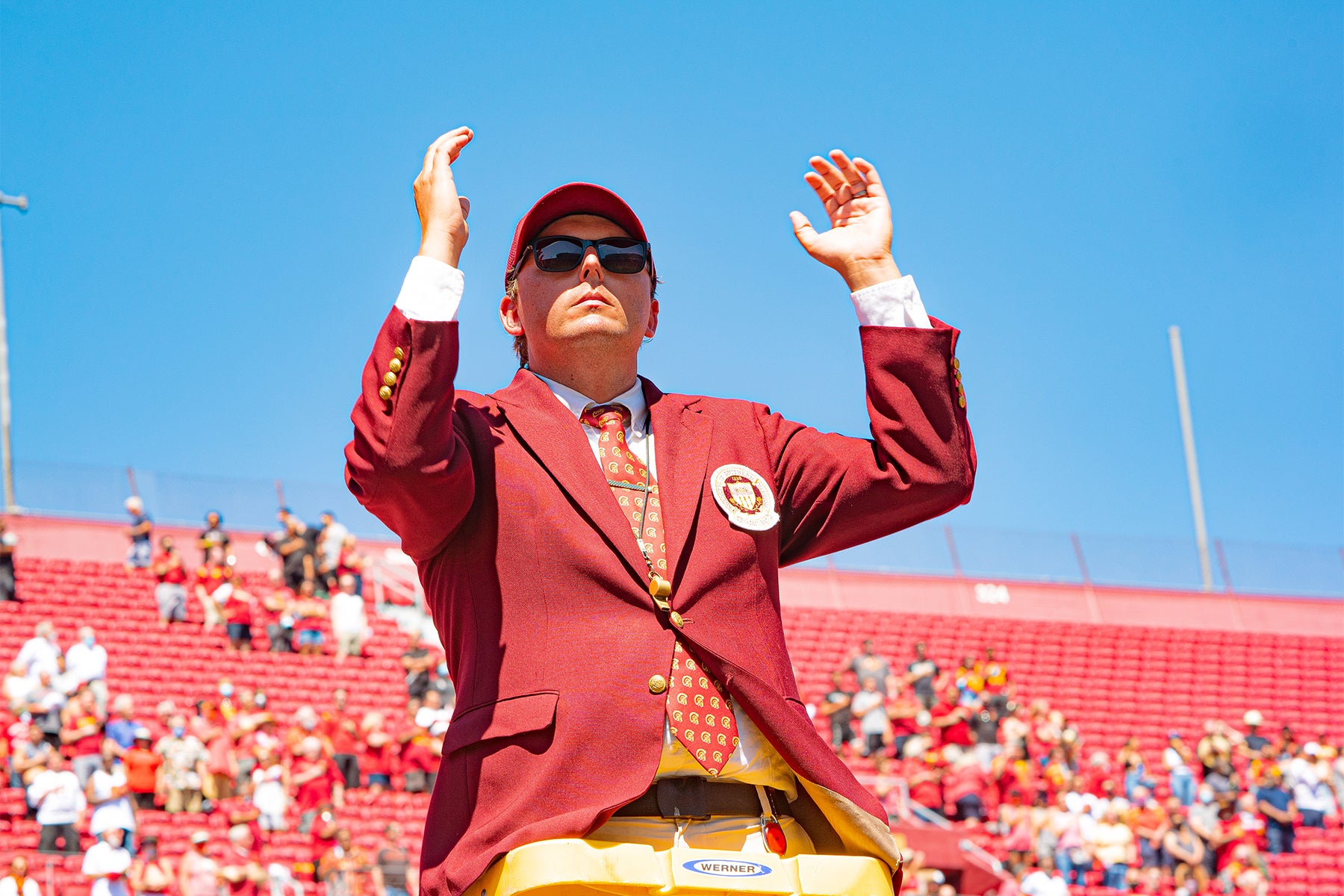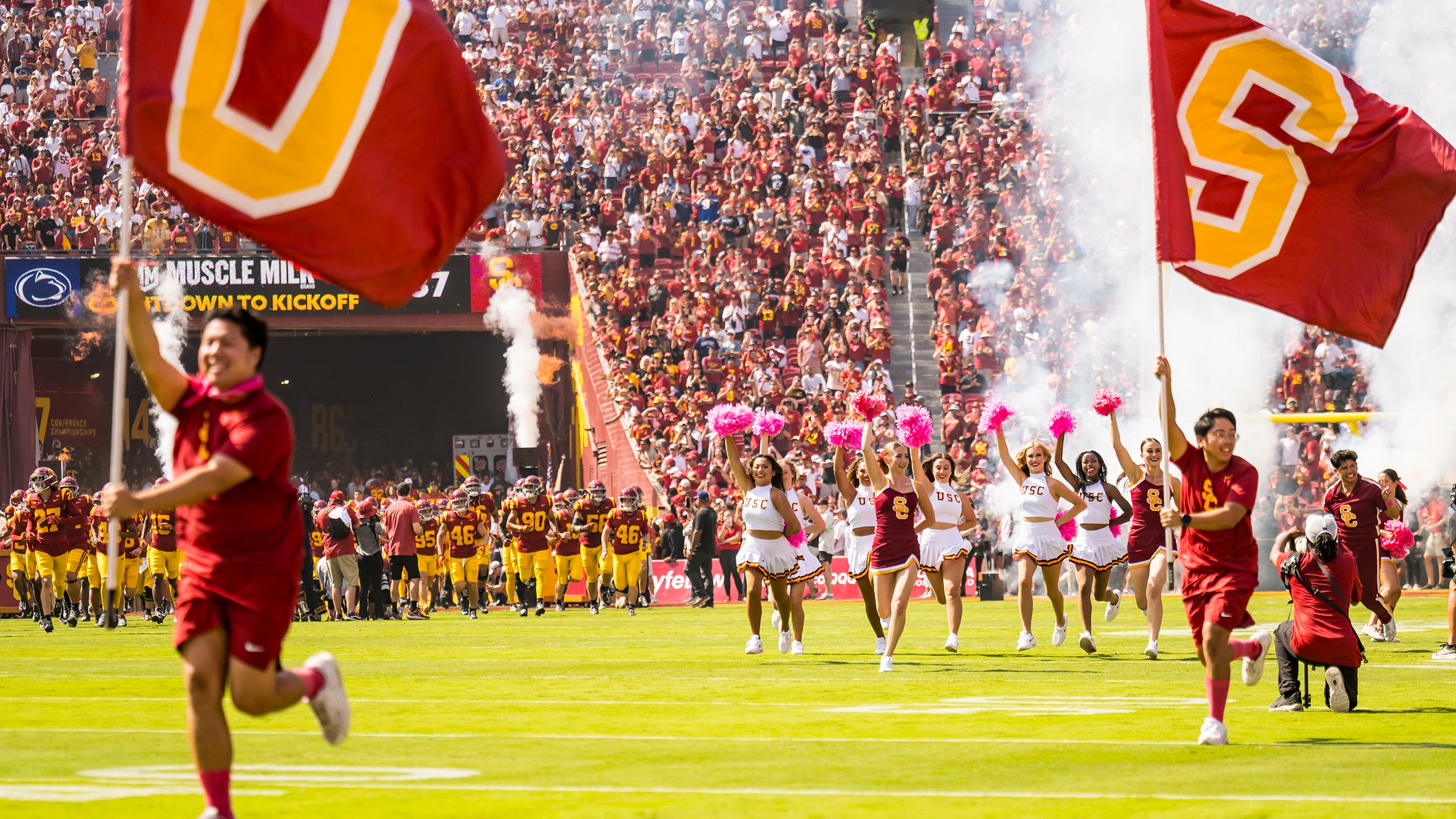
“The Spirit of Troy” — a moniker typically reserved for the Trojan Marching Band — now applies to all five of USC’s spirit groups. (Photo/Ben Chua)
Ambassadors of Trojan pride unite under ‘The Spirit of Troy’ moniker
USC’s iconic Song Leaders, Spirit Leaders, Tommy Trojan, Traveler and Trojan Marching Band join under one umbrella to promote the Fight On spirit.
As USC prepared to ramp up in-person activities and welcome students back to campus for the start of the 2021 fall semester, the Trojan Family was still reeling from more than a year of pandemic shutdowns, online commencements and Zoom classes.
In that moment, USC Vice President for Student Life Monique S. Allard and newly hired USC Trojan Marching Band Director Jacob Vogel saw an opportunity for the university’s five ambassadors of school spirit — the Trojan Marching Band, USC Spirit Leaders, USC Song Leaders, the Tommy Trojan mascot and Traveler — to unite to reignite the Fight On spirit on campus.
To that end, the team rebranded “The Spirit of Troy” — a moniker typically reserved for the Trojan Marching Band — to include all five spirit groups.

“It was at a time when the university was looking to us to bring them back into the fray and to remind them of what a sense of normalcy was before the pandemic,” Vogel said.
Vogel took over as the director of the Trojan Marching Band at the beginning of 2021 after four years as its associate director and arranger. Since then, Vogel’s position has evolved to include the management of all USC spirit groups.
After Vogel’s hiring, Allard and her team discussed how to further enhance and invest in the university’s spirit programs. They hired Nicole Martin in the inaugural role of assistant director of spirit programs to help support and pull together the collective energy of the groups.
“This is a real opportunity for the teams to move in a more organized way, and for the students to be more supported,” she said. “These changes may not be easily seen by many, but I’m sure they’re felt by all the student participants.”
The Spirit of Troy: Breaking through silos
Although the five spirit programs frequently collaborated to support university events in the years before joining under The Spirit of Troy umbrella, the groups operated in silos. Some — including the Spirit Leaders, the Song Leaders and Traveler — were organized under USC Recreational Sports, while the Trojan Marching Band operated independently.

When Vogel assumed the role of associate band director in 2016, he immediately noticed the disjointed relationship between the five arms of the university’s spirit team. Once he became band director, he saw firsthand how this lack of cohesion led to complications as he and his team coordinated travel and accommodations for joint spirit group appearances off campus.
“We had all these great players, but we weren’t working as a team,” Vogel said.
He advocated for the spirit teams to come under the management of the Trojan Marching Band not only to improve collaboration but also to join forces to raise the spirits of a student body that had experienced missed high school graduations and college commencements — and had started the school year from their laptops.
Together with Martin, Allard and the team at the Office of Student Life, Song Advisor Audrea Harris and Spirit Advisor Bria Biggs, Vogel has built a full administrative structure to support the efforts of the staff and students involved in the spirit programs, as they share the Spirit of Troy with Trojans fans around the world.
“They’re just iconic figures of what it means to be a Trojan and the Trojan spirit,” Allard said. “The impact is far and wide — every member really appreciates the opportunity to be part of something so special.”
A more inclusive and holistic approach
Although the Trojan Marching Band’s early lineups consisted mostly of music majors, the largest spirit group on campus now boasts more than 300 students from nearly every major. With the joining together of the spirit groups, the opportunities for a greater diversity of experiences and perspectives are endless, Allard said.
While Vogel highlights that USC Recreational Sports did a great job managing the spirit and song programs, he argues that having the two groups under the The Spirit of Troy banner allows for a more holistic approach to artistic collaboration.

“When you bring together people with a diversity of artistic experience into the room, it changes the perspectives of meetings,” he said. “It changes our priorities as we support athletics and university events.”
Vogel said that this continued evolution is the strength behind the spirit teams’ rebranding.
“With every interaction, every performance, every meeting, every game, we have a new opportunity for us to get to know each other better as an organization and continue to develop,” he said. “To be better for our students.”
That diversity of artistic backgrounds has also transformed how students participate in the various spirit groups. According to Vogel and Martin, it has now become more common for students to jump from one spirit team to another, as they continue to better understand their own skills, interests and ambitions.
For instance, several members of the current Spirit Leaders came from the Trojan Marching Band. “I don’t think they would have known or felt confident in being able to audition for that process if they hadn’t had that exposure to the team through the Spirit of Troy collaboration,” Martin said.
Last year also saw the evolution of the Song team from Song Girls to Song Leaders, a change Vogel said better reflected the program overall. The team had previously used the Song Leaders moniker; Vogel explained that in this transition time of unity and cohesion, it made sense to move back to a name that more closely resembled that of the Spirit Leaders, a group they are often paired with.
Ushering in a new era of competition — and Trojan pride
“At the core of all of our work is creating a really positive experience and environment for all students,” said Allard, adding that enhancing the spirit programs is an opportunity to affect the entire student body. “All of our teams are made up of USC students. We want everyone, while in the spirit programs, to have a positive and transformative experience that not only stays with them for the rest of their lives but also influences how they represent and enhance the university spirit at large.”
In terms of The Spirit of Troy helping lead USC into its new position in the Big Ten Conference, Allard says the future is unlimited. “Building off the decades of incredible accomplishment in our history, we’re looking forward to all that we can build for decades to come in the new conference,” she said. “It’s just a really exciting time.”
Vogel agrees. “Not only are we blazing new trails of creativity within our organization, but the joining of the Big Ten Conference has opened our eyes to the varying performance practices of our conference peers,” he said. “I’m certain they’re sharing in the sentiment as we continue to bring The Spirit of Troy all across the country to the storied venues of our new colleagues.”



